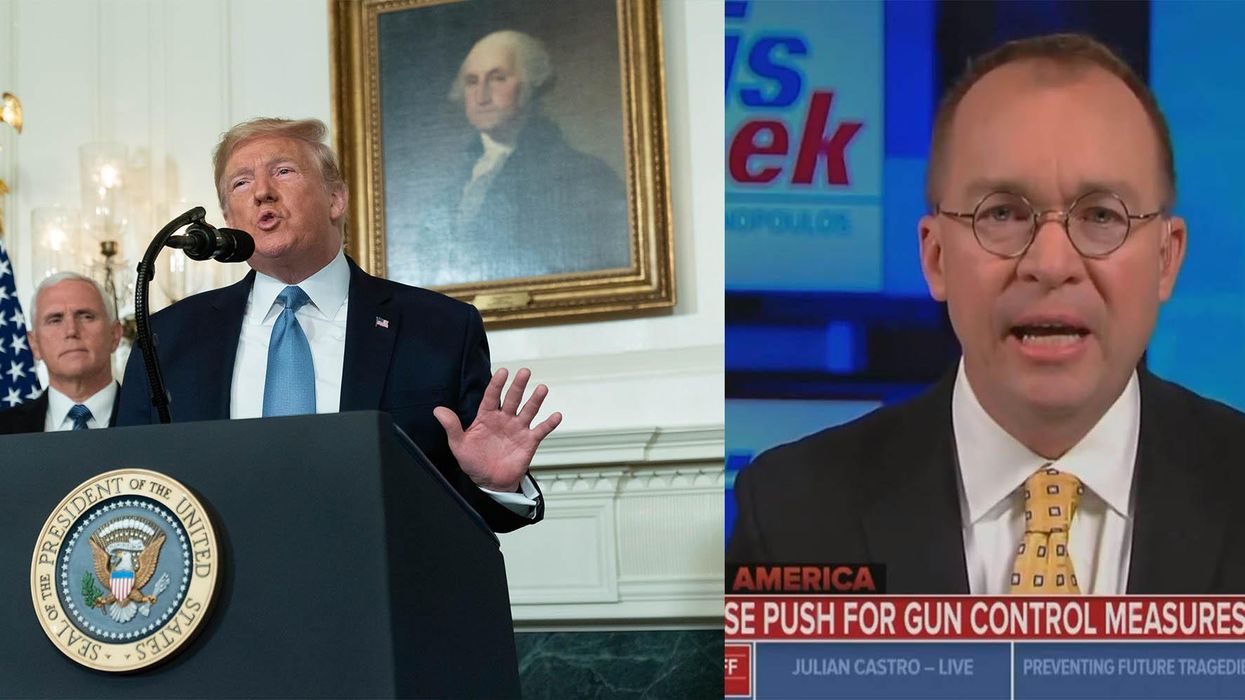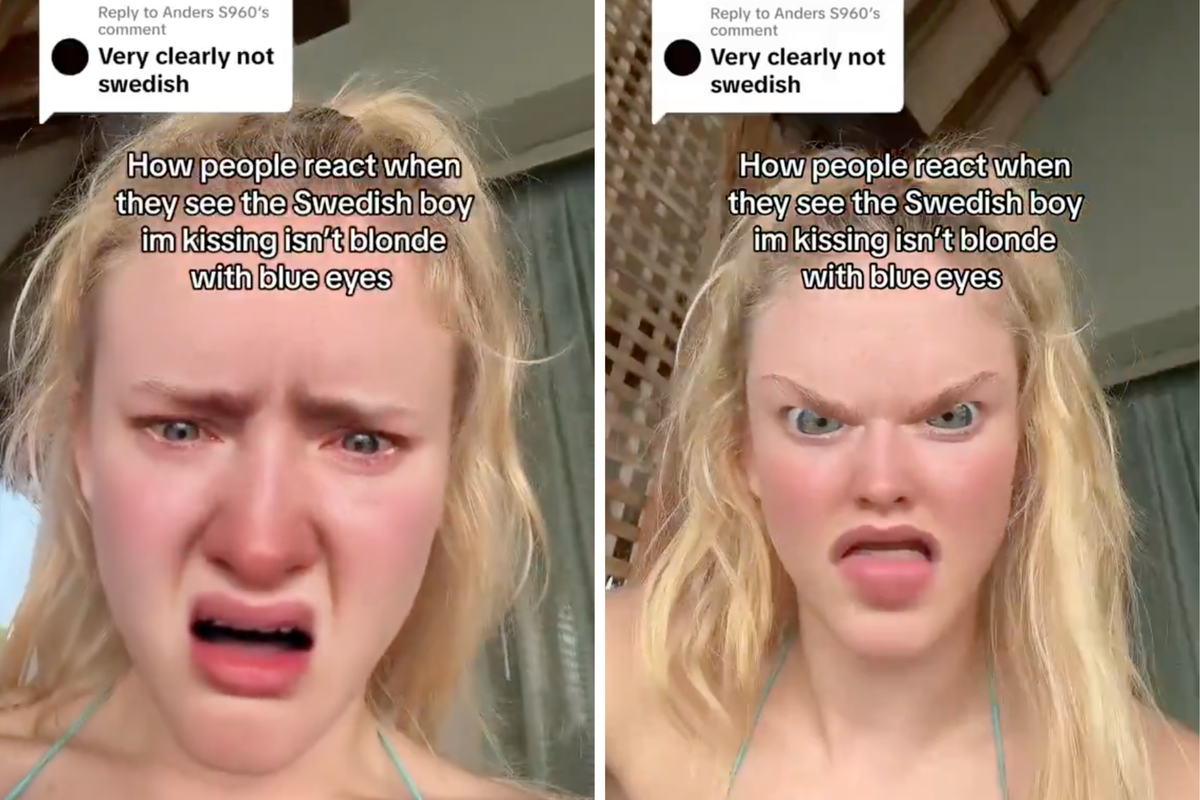News
Joe Sommerlad
Aug 05, 2019
Donald Trump's response to the two devastating mass shootings that took place in America over the weekend has so far been widely attacked as inadequate.
With 29 people dead and more than 50 injured after gunmen opened fire at a Walmart store in El Paso, Texas, and in the city of Dayton, Ohio, the president kept a low profile at his golf resort in Bedminster, New Jersey, sending out a few limp tweets expressing remorse in between praising UFC brawler Colby Covington and crashing another MAGA wedding.
When he did appear at an airport in Morristown en route to Washington on Sunday night, Trump was characteristically vague about tightening gun control legislation and quick to place the blame on the psychological wellbeing of the perpetrators, rather than their ready access to lethal firearms:
Hate has no place in our country, and we're going to take care of it.
I’m talking to a lot of people, and a lot of things are in the works.
But this is also a mental illness problem, if you look at both of these cases, this is mental illness... These people are really very seriously mentally ill.
On Monday morning Trump followed up his comments with a tweet declaring that "Republicans and Democrats must come together and get strong background checks, perhaps marrying this legislation with desperately needed immigration reform", which looked both politically opportunistic and nonsensical given that both suspected shooters were US citizens.
At a White House press conference, Trump said the "twisted monsters" responsible had committed "crimes against all humanity", addressing America's culture of violence, hate speech online and calling for the nation to "condemn racism, bigotry and white supremacy".
But his Democratic rivals are unlikely to be placated by the address - especially given that Trump failed to blame gun laws and even managed to express his sorrow for the wrong Ohio town, commiserating with the people of Toledo, not Dayton.
In the immediate aftermath of the shootings, the opposition were quick to trace the atrocities to the president's own history of racist rhetoric - refferring to Mexican's as rapists, failure to condemn white supremacy following the Charlottesville attack, referring to "s***hole countries" etc. - which recently blew up into fresh scandal when Trump targeted the Squad, veteran congressman Elijah Cummings and the city of Baltimore on Twitter with disparaging comments.
New Jersey senator and 2020 presidential contender Cory Booker said of Trump on NBC's Meet the Press:
You reap what you sow, and he is sowing seeds of hate in this country. This harvest of hate violence we're seeing right now lies at his feet. He is responsible.
El Paso native and fellow challenger Beto O'Rourke told CNN's State of the Nation:
He is encouraging this. He doesn't just tolerate it; he encourages it. Folks are responding to this… He is an open, avowed racist and is encouraging more racism in this country. And this is incredibly dangerous for the United States of America right now.
Bernie Sanders, Julian Castro, Pete Buttigieg all chimed in, with Chuck Schumer and Alexandria Ocasio-Cortez among those challenging Senate minority leader Mitch McConnell to recall the upper chamber of Congress from its summer recess to vote on a universal background check bill the House of Representatives passed way back in February that he has sat on ever since.
But what about the Republicans?
With the hashtag #MassacreMitch trending on Twitter, McConnell was attacked for being in the pocket of the National Rifle Association (NRA), America's all-powerful firearms lobby.
This is a charge commonly levelled against America's conservative statesmen and would explain the rush the GOP was in to blame anyone but weapons manufacturers for the shootings.
Trump's acting chief of staff, Mick Mulvaney, toed the same line as the president during his appearance on ABC's This Week on Sunday, insisting the killers were "sick people" and that:
There's no benefit here to try to make this a political issue. This is a social issue and we need to address it as that.
Vice president Mike Pence, Florida congressman Matt Gaetz and Texas governor Greg Abbott all expressed their horror and offered the customary (if frankly meaningless) "thoughts and prayers" for the bereaved and the injured.
Few of their colleagues were willing to explicitly call for stronger gun restrictions or to denounce the toxic white nationalism expressed in the El Paso suspect's manifesto (votes are votes, after all, they must have told themselves with a shrug).
In search of alternative scapegoats, both House minority leader Kevin McCarthy and Texas lieutenant governor Dan Patrick appeared on Fox News to blame video games like Call of Duty (a line Trump himself would pick up in his press conference), with Patrick saying:
We've always had guns, we’ve always had evil. But what's changed where we see this rash of shooting? I see a video game industry that teaches young people to kill.
While men like Ohio senator Rob Portman meanwhile expressed depressing orthodoxies like...
No law can correct some of the more fundamental cultural problems we face today as a country.
... There were some noble exceptions.
Ivanka Trump (!), Ted Cruz and Dan Crenshaw all called out white supremacy without prompting.
Pennsylvania senator Pat Toomey perhaps took the strongest line of all, breaking ranks to say on Twitter:
While no law will end mass shootings entirely, it's time for Congress to act to help keep our communities safer.
We should start by passing bipartisan proposals such as my legislation with Senator Joe Manchin to expand background checks to all commercial firearm sales.
Let's hope they listen to him.
Top 100
The Conversation (0)













